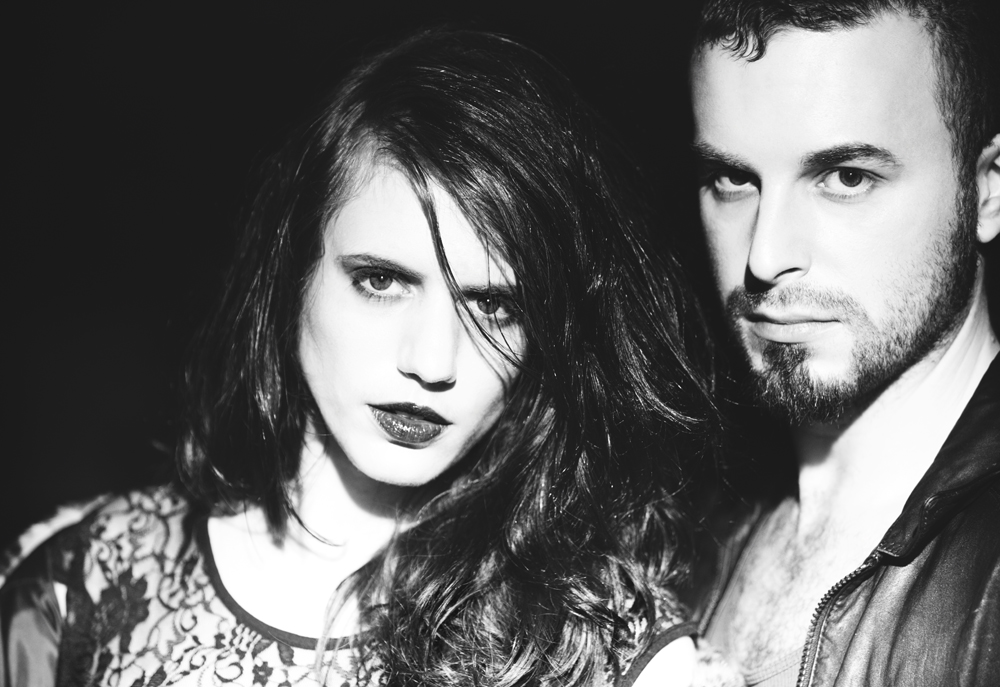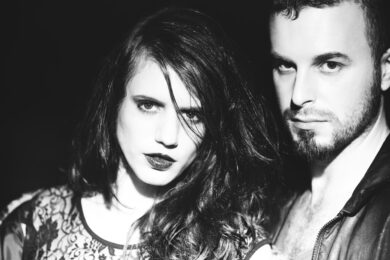Like the memorable scene from Hitchcock’s The Birds, it seems that suddenly The Unkindness Of Ravens are sitting, like a watchful flock, on the metaphorical wires that have carried the musical leitmotifs of the last twelve months. They have released only three singles, but their dystopian styling and unsettling pop rumble have effectively courted positive noise from cult blogs to commercial quarters like XFM and Top Shop: the current zeitgeist has been kind to the Unkindness.
The pair’s stripped back and heavily stylised offerings fall easily into step with iconic duo outfits like The White Stripes and The Kills – something which songwriter Ben Raine both acknowledges and despairs of. “We’re nothing like Crystal Castles or The Kills. People are so lazy with that whole Kills comparison thing: it’s just using the most obvious point of comparison,” he declares wearily.
Where Raine and vocalist Nina Wagner perceive their difference – and their appeal – is in their fiercely independent and intensively exacting approach to creation. Whilst Raine and Wagner are more often than not clumsily lumped in with contemporary electro and industrial, at perhaps the heart of their unorthodoxy is an entirely different trajectory: they’re hoping to execute a precise, widescreen neo-grunge aesthetic, rejecting British pop for the Great American Riff, in combination with the relentless minimal machine beat of early British techno.
Raine and Wagner also chose to start their own label. Thusly, The Unkindness Of Ravens can release exactly what they wish, when they wish – but don’t mistake that for a lack of ambition. “For us, it’s very exciting to be so DIY," Raine says. "We feel like the world is still waiting for that one big band which has risen to the top complete off their own back. Whether we become as big as that is obviously unknown but I think we can probably get pretty close. We want to see how far we can take it completely on our own resources."
Tell us about the mystery-enshrouded past: from whence did The Unkindness of Ravens stem?
Ben Raine: I’d been playing bass in lots of bands… some were really good bands, but we had wasted a lot of time chasing ever elusive record deals. Disillusioned, I decided not to be in a band for a while. I said ‘fuck this’, got myself a really good job and stopped doing music altogether. And then I woke up one day and thought ‘I’m wasting my life’, so I quit the job, moved to the country, wrote a load of songs and then came back to London two months later to start a new group.
This time, I knew I wanted a two-piece rather than a full band. This was the last roll of the dice for me, so I decided that I was going to do it exactly my way. I wanted it to be small and compact. I wanted to move fast – I was fed up with being in a band where everyone had jobs and it was so hard to get everyone in the same room at the same time. It needed to be really effective and efficient. I had been in bands with girl singers before and I liked that sound, so I put an ad on Gumtree and Nina was one of the first people to answer it.
Nina Wagner: I’d always sang, and played the piano for many years. When I came to London to study I started to join various little bands, but didn’t take it very seriously. After graduating, I joined a producer and put together a duo – we were heavily Massive Attack influenced, and my singing was a bit jazzy and mellow. It always had been, really. That broke up but I was addicted to music, so I needed to do something.
I stumbled across Ben’s ad on Gumtree – and went onto his Myspace and checked out his sound. I thought it sounded intersting and sent a loose message that I possibly might be interested. We met up and had a few pints, and got on really well, and he invited me to audition at his house. We tried out a song or two, and I was interested enough to come back for more. After a few tries I thought ‘Yes: let’s do this’. It’s not the most glamorous story… I was nervous: my musical background wasn’t very heavy although my favourite music was heavy rock and grunge.
BR: I finally managed to find someone to work with who was seriously into grunge! I love Sonic Youth, Nirvana, White Stripes, Queens Of The Stone Age: heavy American bands. I totally bypassed Britpop and there aren’t many English bands I’m into: for me it’s all about big riffs, stripped down raw arrangements and great melodies.
So you don’t like British pop music?
BR: I don’t want to make music that dates, and Brit Pop in particular dated so badly in a way grunge hasn’t. The Beatles, though, are one of my top three favourite bands. Going back to the idea of efficiency in terms of song writing, they don’t waste anything. Every guitar line has to be memorable – most people can remember and hum at least one George Harrison guitar line.
NW: I was brought up with the Beatles and am a big, big fan. They’re completly intertwined with my childhood.
BR: My young sister hadn’t heard of the Beatles until a few years ago and that scared the shit out of me – the concept that people growing up now haven’t heard of The Beatles, and it frightens me that it will be more common in future. They brought so many innovations to pop music, there’s so much to learn from them and from their attitude. ‘Tomorrow Never Knows’ was the first proper electronic or big beat or dance track, and ‘Taxman’ is also fucking awesome – the guitar solo is just ridiculous: Indian sounds and backward guitars. I also love how they stopped playing gigs and became purely a studio based band for best part of career.
Given your preference for US grunge, what do you make of the frequency with which you’re labeled as part of the ‘new UK industrial’?
BR: I’ve always been into UK electronic dance music: Leftfield, Future Sound of London… that’s a road we’re going to go down a lot more in our new material. But people do say we’re very industrially influenced and NINesque, but that’s just people trying to pigeon hole us. Early on I made a lot of electronic music and now wanted to combine that with rock because I really love big riffs. What we are trying to come up with is something far more like neo grunge.
You moved to Berlin to record your album – shades of Bowie? Eno?
BR: We’ve written half of [our upcoming] album already, and we want to write more here and then record it all. We want the head space and inspiration of living in a different city, especially somewhere we’re not working at the same time. I know it’s cliched, but we want to be walking the same streets as people we respect who came here to write and record: it appeals to our rock & roll sensibilities.
What’s the band’s kit? You have a plentiful roar for a two piece…
BR: I play bass – which is something most people don’t realise. If you see us live you’d think we are a four piece because it’s such a huge sound for just two people: and we’re not relying on backing tracks either, only the drums are on backing tape. I trigger extra electronic sounds though my bass. I love pushing the technological possibilities of my instrument.
We tried adding a live drummer in conjunction with the electronics, but it was too messy – it’s very important to preserve a sense of space. I want to keep everything incredibly economical and don’t want to waste any notes – the desire to be very concise and efficient runs through everything we do.
What’s in a name: gothic references perhaps?
BR: A friend told me some time ago that an unkindness is the collective noun for ravens. I liked that, and found it incredibly dark. Finding that name made me decide to start this band – it all flows on from that.
Ingmar Bergman once said art is only interested in love and death. I don’t write about death but I feel the importance of experiencing a sense of wonder. Without wishing to sound wanky, there are things we think and wonder about in our purest moments and I try to put that into songs that kick arse. Nina and I both studied film and both have a sense of the cinematic in our art. I love Bergman, Scorsesi and David Lynch is a massive influence on us. I don’t want to waste words and I agonise about every line: nothing is throw-away.



